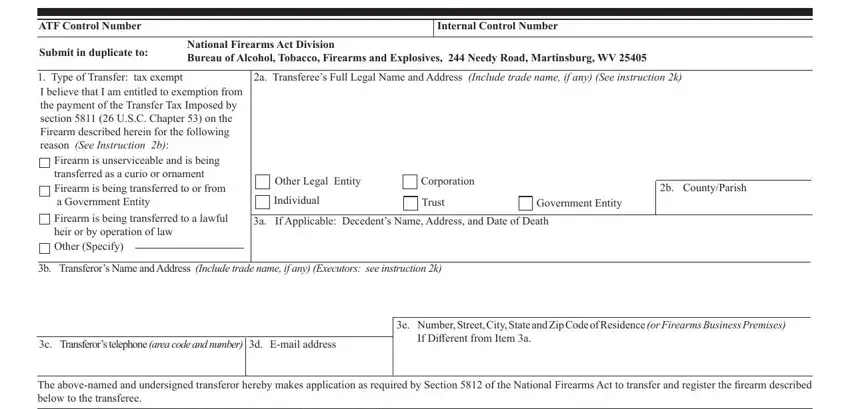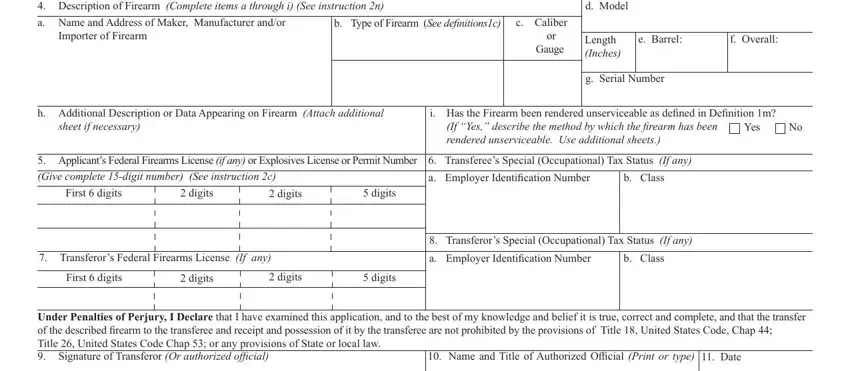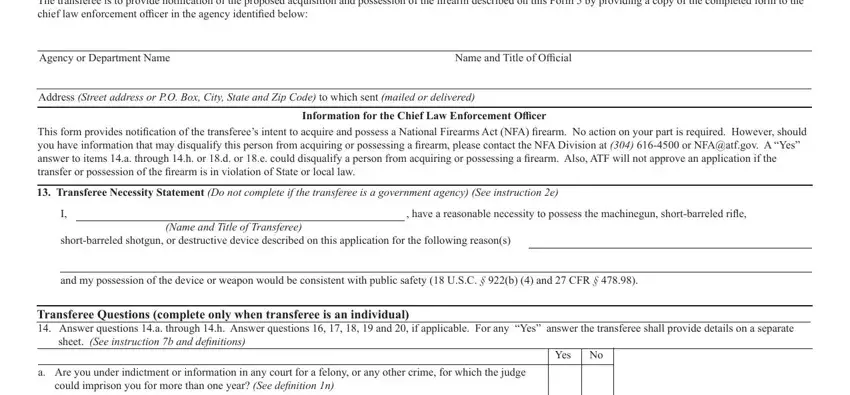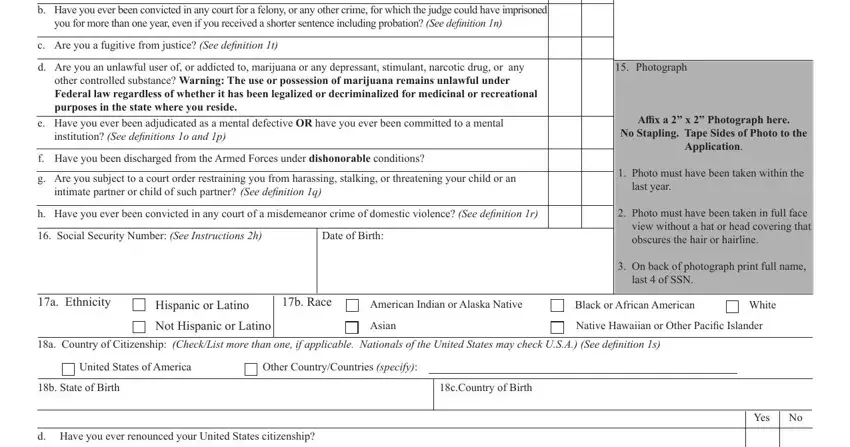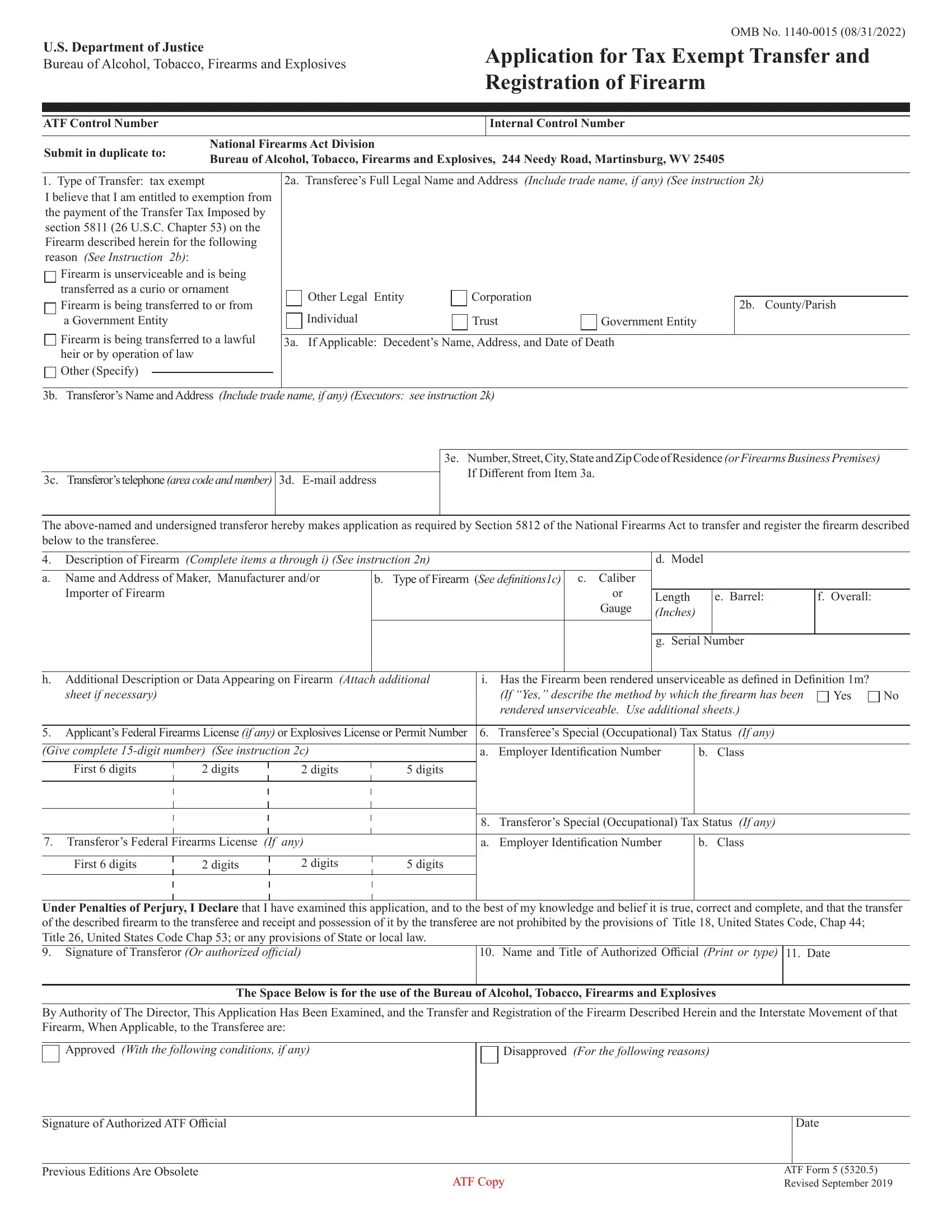a.National Firearms Act (NFA). Title 26, United States Code, Chapter
53. The implementing regulations are found in Title 27, Code of Federal Regulations, Part 479.
b.Gun Control Act (GCA). Title 18, United States Code, Chapter 44. The implementing regulations are found in Title 27, Code of Federal Regulations, Part 478.
c.Firearm. The term “firearm” means: (1) a shotgun having a barrel or barrels of less than 18 inches in length; (2) a weapon made from a shotgun if such weapon as modified has an overall length of less than 26 inches or a barrel or barrels of less than 18 inches in length; (3) a rifle having a barrel or barrels of less than 16 inches in length; (4) a weapon made from a rifle if such weapon as modified has an overall length of less than 26 inches or a barrel or barrels of less than 16 inches in length; (5) any other weapon as defined in 26 U.S.C. § 5845(e); (6) a machinegun;
(7) a muffler or silencer for any firearm whether or not such firearm is included within this definition; and (8) a destructive device.
d.Person. A partnership, company, association, trust, corporation, including each responsible person associated with such an entity; including each responsible person associated with such an entity; an estate; or an individual.
Section A
e.ResponsiblePerson. Inthecaseofanunlicensedentity,includinganytrust,partnership, association,company(includinganyLimitedLiabilityCompany(LLC)),orcorporation,any individualwhopossesses,directlyorindirectly,thepowerorauthoritytodirectthe managementandpoliciesofthetrustorentitytoreceive,possess,ship,transport,deliver, transferorotherwisedisposeofafirearmfor,oronbehalfof,thetrustorlegalentity.
Section B
Ttrust:Thosepersonswiththepowerorauthoritytodirectthemanagementand policiesofthetrustincludesanypersonwhohasthecapabilitytoexercisesuchpower andpossesses,directlyorindirectly,thepowerorauthorityunderanytrustinstrument,or under Statelaw,toreceive,possess,ship,transport,deliver,transfer,orotherwise disposeofafirearmfor,oronbehalfofthetrust. Examplesofwhomaybeconsidereda responsiblepersonincludesettlors/grantors,trustees,partners,members,officers,directors, boardmembers,orowners. Anexampleofwhomaybeexcludedfromthisdefinitionof responsiblepersonisthebeneficiaryofatrust,ifthebeneficiarydoesnothavethecapability toexercisetheenumeratedpowersorauthorities.
f.Employer Identification Number (EIN). Required of taxpayer filing special (occupational) tax returns under 27 CFR § 479.35.
g.Special (Occupational) Tax. Required by the NFA to be paid by a
Federal firearms licensee engaged in the business of manufacturing (Class 2), importing (Class 1), or dealing (Class 3) in NFA firearms.
h.Federal Firearms License. A license issued under the provisions of the GCA to manufacture, import or deal in firearms.
i.ATF Officer. An officer or employee of the Bureau of Alcohol, Tobacco,
Firearms and Explosives (ATF) authorized to perform any function relating to the administration of the NFA.
j.Transfer. Selling, assigning, pledging, leasing, loaning, giving away, or otherwise disposing of a firearm.
k.Transferor. The person selling or otherwise disposing of a firearm; including applying to transfer a firearm.
l.Transferee. The person acquiring the firearm.
m.Unserviceable Firearm. One which is incapable of discharging a shot by means of an explosive and incapable of being readily restored to firing condition. An acceptable method of rendering most firearms unserviceable is to fusion weld the chamber closed and fusion weld the barrel solidly to the frame.
n.Prohibited Person. Generally, 18 U.S.C. § 922 (g) prohibits the shipment, transportation, receipt, or possession in or affecting interstate commerce of a firearm by one who: has been convicted of a misdemeanor crime of domestic violence; has been convicted of a felony, or any other crime, punishable by imprisonment for a term exceeding one year (this does not include State misdemeanors punishable by
addicted to, marijuana or any depressant, stimulant, or narcotic drug, or any other controlled substance; has been adjudicated as a mental defective or has been committed to a mental institution; has been discharged from theArmed Forces under dishonorable conditions; has renounced his or her U.S. citizenship; is an alien illegally
in the United States or an alien admitted to the United States under a nonimmigrant visa; or is subject to certain restraining orders. Furthermore, Section 922 (n) prohibits the shipment, transportation, or receipt in or affecting interstate commerce of a firearm
by one who is under indictment or information for a felony in any Federal, State or localcourt,oranyother crime,punishablebyimprisonmentforatermexceedingoneyear.
An information is a formal accusation of a crime verified by a prosecutor.
EXCEPTION: A person who has been convicted of a felony, or any other crime, for whichthejudgecouldhaveimprisonedthepersonformorethanoneyear,orwhohasbeen
convicted of a misdemeanor crime of domestic violence, is not prohibited from purchasing,receiving,orpossessingafirearmif: (1)underthelawofthejurisdictionwhere
the conviction occurred, the person has been pardoned, the conviction has been expunged
or set aside, or the person has had their civil rights (the right to vote, sit on a jury, and hold publicoffice) takenawayandlaterrestoredAND(2)thepersonisnotprohibitedbythelaw of the jurisdiction where the conviction occurred from receiving or possessing firearms.
Persons subject to this exception should mark “no” in the applicable box.
o.Adjudicated as a Mental Defective. Adetermination by a court, board, commission, or other lawful authority that a person, as a result of marked subnormal
intelligence, or mental illness, incompetency, condition, or disease: (1) is a danger to himself or to others; or (2) lacks the mental capacity to contract or manage his own affairs. This term shall include: (1) a finding of insanity by a court in a criminal case; and (2) those persons found incompetent to stand trial or found not guilty by reason of lack of mental responsibility.
p.Committed to a Mental Institution. Aformal commitment of a person to a mental institution by a court, board, commission, or other lawful authority. The term includes a commitment to a mental institution involuntarily. The term includes commitment for mental defectiveness or mental illness. It also includes commitments for other reasons, such as for drug use. The term does not include a person in a mental institution for observation or a voluntary admission to a mental institution.
EXCEPTION NICS ImprovementAmendmentsAct of 2007: Aperson who has been adjudicated as a mental defective or committed to a mental institution in a state proceeding is not prohibited by the adjudication or commitment if the person has been granted relief by the adjudicating/committing state pursuant to a qualifying mental health relief from disabilities program. Also, a person who has been adjudicated as a mental defective or committed to a mental institution by a department or agency of the Federal Government
is not prohibited by the adjudication or commitmemt if either (a) the person’s adjudica tion or commitment was set-aside or expunged by the adjudicating/committing agency;
(b)the person has been fully released or discharged from all mandatory treatment, supervi sion, or monitoring by the agency; (c) the person was found by the agency to no longer suffer from the mental health condition that served as the basis of the initial adjudication/ commitment; or (d) the adjudication or commitment, respectively, is based solely on a medical finding of disability, without an opportunity for a hearing by a court, board,
commission, or other lawful authority, and the person has not been adjudicated as a mental defective consistent with section 922(g)(4) of title 18, United States code; or (e) the person was granted relief from the adjudicating/committing agency pursuant to a qualified mental
health relief from disabilities program. Persons who fall within one of the above exceptions should mark “no” in the applicable box. This exception to an adjudication or commitment by a Federal department or agency does not apply to any person who was adjudicated to be not guilty by reason of insanity, or based on a lack of mental responsibil ity, or found incompetent to stand trial, in any criminal case or under the Uniform Code of Military Justice.
q.Restraining Order. Under 18 U.S.C. § 922, firearms may not be sold to
or received by persons subject to a court order that: (A) was issued after a hearing
which the person received actual notice of and had an opportunity to participate in;
(B) restrains such person from harassing, stalking, or threatening an intimate partner or
child of such intimate partner or person, or engaging in other conduct that would place an intimate partner in reasonable fear of bodily injury to the partner or child; and (C)(i) includes a finding that such person represents a credible threat to the physical safety of such intimate partner or child; or (ii) by its terms explicitly prohibits
the use, attempted use, or threatened use of physical force against such intimate partner or child that would reasonably be expected to cause bodily injury. An “intimate partner” of a person is: the spouse or former spouse of the person, the parent of a child of the person, or an individual who cohabitates or has cohabitated with the person.
ATF Form 5 (5320.5)
Revised September 2019
